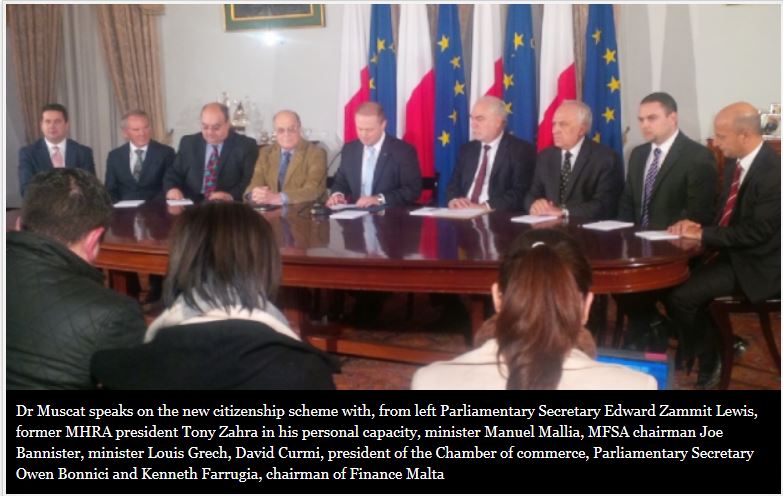Chairman of ‘sale of citizenship’ fund does not know where money is or how much there is
The National Development and Social Fund Agency, which at law is supposed to receive a significant part of the money from the sale of Maltese citizenship, is chaired by the former head of the only non-government constituted body to have backed the government on the sale of citizenship.
David Curmi, who became president of the Chamber of Commerce in April 2013 in an otherwise uncontested election, sat at the Prime Minister’s side at the press conference to launch the ‘revised’ sale of citizenship programme in December 2013 (see photograph below). He was the only head of a non-government constituted body to do so. Finance Malta is public-private. Other constituted bodies, including the Malta Employers Association, had put up strong objections to the scheme.
At the time I had written about how odd it was that the Chamber of Commerce, which had made no formal statement backing the scheme, had lent its president (and thereby its legitimacy) for the Prime Minister’s press conference.
I rang David Curmi this morning to ask him whether the Prime Minister had promised him the post of chair of the development fund at the time when he, as president of the Chamber of Commerce, worked to bring the Chamber on board in support of the Prime Minister’s scheme.
He replied: “Absolutely not. It was offered to me much later. It is a non-executive post, not a job, and I don’t earn any money from it. My actual job is managing big funds and I took this post for that reason. I thought it would be interesting.”
I asked him when exactly the Prime Minister offered him the post and Curmi replied: “About eight months ago.”
UPDATE/He later email to say that he received his formal letter of appointment on 15 September 2015 and that the first board meeting was held on 7 December that year.
“We have had just three board meetings so far, with another one planned for this month,” he said. “The money is sitting in an Identity Malta account as far as I am aware. I am not privy to that kind of information.” Accounts specifically for the fund have yet to be opened at the Central Bank, eight months after the appointment of the board and 16 months after the legal notice to set up the fund.
I then asked Curmi whether he thinks it appropriate that he should have accepted to chair the government’s fund for the citizenship-sale money when he was instrumental in bringing the Chamber of Commerce on board to support the government in introducing the scheme itself. Doesn’t he think it looks bad? It looks as though he was given the post as thanks even if he wasn’t actually promised it beforehand as an incentive to help bring the Chamber of Commerce on board.
“It reflects badly on the Chamber of Commerce,” I said. But David Curmi replied: “I don’t think it’s inappropriate.”
“The Chamber was very much involved in the process to reform the scheme from its original format,” he said. “Knowing that the government was going to implement it anyway, we decided that rather than speaking out against it we would work with the government to see how it could be improved. We did this as a constituted body, and it wasn’t my decision alone because the Chamber has a council. The details bothered the Chamber.”
I asked him what he meant by “knowing that the government was going to implement it anyway”, and whether he thinks it appropriate for an influential business lobby in a democracy to take the stance that if the government is to go ahead and do something fundamentally objectionable regardless of objections, then it may as well play ball with the government instead of sounding the alarm.
Curmi replied: “The way we looked at it was that other countries were doing it anyway.”
I asked him which other countries. “Portugal, Cyprus, and now we are hearing about Ireland.” I pointed out that those schemes are completely different and not even remotely comparable.
The government’s setting up of the National Development and Social Fund Agency has been marked by chaos, inefficiency, delays and even one or two major lies to the public.
The final version of the sale-of-citizenship programme was announced in December 2013, but the legal notice to set up the fund (LN2/2015, amending the Public Administration Act) was not published until 15 months later, in March 2015. That month, David Curmi’s two-year term of office as Chamber of Commerce president expired and Anton Borg was elected.
In June of that year – 18 months after the scheme was launched and three months after the legal notice, the Times of Malta reported that the board of governors for the fund had not yet been appointed, and that the fund/agency did not exist beyond the legal notice.
In October of that year – almost two years after the press conference announcing that the sale of citizenship had been finalized, and eight months after the legal notice to set up the fund – the Prime Minister announced that the board of governors had just been appointed, that it would be chaired by “former Chamber of Commerce president David Curmi”.
The Prime Minister also announced at that point that “the fund already holds €75 million”. But eight months later, through the story in the Times of Malta last Saturday, we discovered that there is no such fund at all. And today, this story reveals that not even the chairman of the fund knows where the money is or how much there is.

This photograph of the Prime Minister’s press conference to announce the ‘improved’ version of the sale of citizenship programme was published in the Times of Malta in December 2013.
